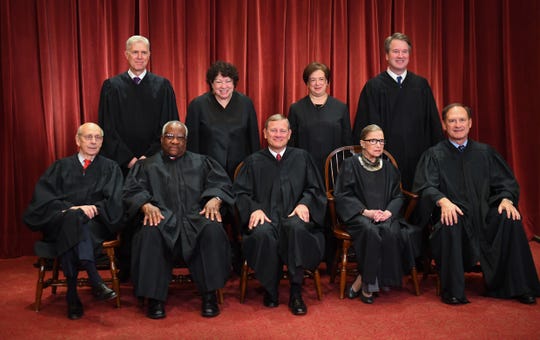Packing the Supreme Court won’t work. Confirmation hearings are already highly politicized.
Proposals to expand the Supreme Court, otherwise known as “court packing,” are coming up again, thanks to Democratic candidates, like Sens. Kamala Harris and Elizabeth Warren. Such a move would only escalate the Senate’s political judicial confirmation battles.
These recent proponents should know. After all, six of the current Democratic candidates served in the Senate during the recent Justice Brett Kavanaugh confirmation hearings. Sens. Cory Booker, Kamala Harris and Amy Klobuchar were in the room during the hearing’s most contentious days.
In comparing the Kavanaugh hearing to past confirmations, there is an obvious difference to senators’ approach to questioning. Decades ago, confirmation hearings were largely collegial with more genuine inquiry. Senators asked questions to get answers. But today, senators largely ask questions to score political points, not to change minds — not even their own.
In studying the evolution of these hearings, one word appears to summarize how these hearings have devolved from genuine inquiry into judicial capabilities into a partisan TV event: empathy.
Our research shows that the question of whether a judge should have empathy has evolved into partisan shorthand, devoid of any real meaning. Like allegations of judges on the left or right crusading as “judicial activists,” the “empathy test” has served as a modern method of politically attacking judicial nominees, at the expense of any real judicial scrutiny. The proposal of court packing, like today’s version of the empathy test, is all political.

The formal 2018 portrait of the Supreme Court of the United States. Seated from left: Associate Justice Stephen Breyer, Associate Justice Clarence Thomas, Chief Justice of the United States John G. Roberts, Associate Justice Ruth Bader Ginsburg and Associate Justice Samuel Alito, Jr. Standing behind from left: Associate Justice Neil Gorsuch, Associate Justice Sonia Sotomayor, Associate Justice Elena Kagan and Associate Justice Brett M. Kavanaugh. (Photo: Jack Gruber, USA TODAY )
Questions about a potential justice’s empathy were originally random and rare. Empathy was first addressed during the Supreme Court confirmation hearing of Lewis Powell, a Richard Nixon nominee, in 1971. Powell was overwhelmingly confirmed, with only one dissenting vote. The lone vote against Powell was by Sen. Fred Harris, D-Okla., who claimed that Powell was “an elitist” who “has never shown any deep feelings for little people.”
Empathy was also referenced twice in Justice Ruth Bader Ginsburg’s confirmation hearing in 1993 — both times by Ginsburg herself to persuade Sen. Howard Metzenbaum, D-Ohio, that she could empathize with workers trying to unionize and with prosecutors and defendants alike in death penalty litigation.
Our current justices had politicized hearings
For members of the current court, the empathy question has become a more consistent inquiry and takes a sharper, more partisan turn. Now, the term carries significant political baggage. It is frequently used to criticize the character of Republican nominees as well as the jurisprudence of nominees tapped by Democrats.
At Chief Justice John Roberts’ confirmation hearing, for instance, Sen. Chuck Schumer, D-N.Y., expressed concern that Roberts — nominated by Republican President George W. Bush — did not “truly empathize with those who are less fortunate and who often need the protections of the government and the assistance of the law to have any chance at all.”
Soon after Justice David Souter’s retirement, Republicans criticized Democrat President Barack Obama for seeking a justice who possessed the “quality of empathy.” This criticism soon shifted to Justice Sonia Sotomayor after her nomination. At her hearing, then-Sen. Jeff Sessions, R-Ala., alleged that “empathy for one party is always prejudice against another.”
Justice Elena Kagan, the second Obama nominee, faced similar criticism from Republican senators. Sen. Chuck Grassley, R-Iowa, echoed Sessions’ earlier criticism when he told Kagan that her empathy equated to “empathi(zing) with certain groups over others.” Concerns of Kagan putting personal preferences above law under this purported “empathy standard” led most Republican senators to vote against her.
On the other hand, Justice Neil Gorsuch was attacked by Democratic senators for not being empathetic enough, particularly regarding the case where a company fired a trucker who was forced to leave his truck due to freezing temperatures.
Interestingly, Democrats did not use the word “empathy” when questioning Gorsuch. Rather, Gorsuch used the word himself, telling Sen. Al Franken, D-Minn., that he “empathize(d) … entirely” with the fired trucker. Senate Democrats were unpersuaded. “Gorsuch’s record shows a stunning lack of compassion for the people his decisions will affect,” said Sen. Tom Udall, D-N.M. In the end, only three Democratic senatorsvoted to confirm Gorsuch.
Imagine the strife if we were to add justices en masse.
Regardless of who appoints a justice, they won’t ignore the law
From these hearings, we are left with competing and increasingly polarized views of the court. On one side, an empathic judge is one that is appointed by a Democratic president and ignores the law in favor of the party more deserving of empathy. On the other, a judge without empathy is likely appointed by a Republican president, is callous and refuses to consider the struggle of average citizens.
These caricatures, of course, neither accurately portray the nuanced views held by the justices on the court nor how individuals can simultaneously understand the suffering of others yet rule according to the law. Today, the empathy question has become no more than a partisan spectacle in which the nominees themselves are obligated to join. Calls for expanding the court would not only be a detriment to the institution itself, but only subject nominees to a further politicized process lacking focus on what matters: How they see law.
Words have meaning. And in judicial politics, they have been used as a tool to politically criticize judicial nominees at the cost of substantive evaluation.
Image credit: Bakdc








